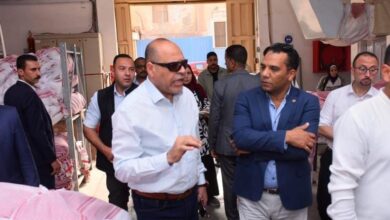Egypt's trade union movement, which was closely controlled by the state for the past 53 years, is witnessing an unprecedented resurgence. Beginning prior to former President Hosni Mubarak's ouster, workers have been gradually moving away from the confines of the Egyptian Trade Union Federation (ETUF), which was dominated by the ruling regime, and served as the only such federation allowed by law.
The ETUF has traditionally been used by the regime as a base for mobilizing government support during elections.
The recently appointed Minister of Manpower, Ahmed Borai, announced on Saturday that the ministry is working on drafting a new law to replace the restrictive Trade Union Law 35/1976. According to Borai, the new trade union law will be based on the recommendations put forth by the independent Center for Trade Union and Workers' Services (CTUWS). The provisions of the new law would conform to International Labor Organization's (ILO) conventions, which Egypt has ratified but failed to uphold for over five decades.
Meanwhile, delegates from the International Trade Union Confederation (ITUC) arrived in Cairo to express their solidarity with Egypt's independent trade union movement, especially the Egyptian Federation of Independent Trade Unions (EFITU), which was established on 30 January. ITUC also announced its intention to establish a regional office in Cairo.
ITUC delegates held an organizational seminar in Cairo on 14 and 15 March entitled "Workshop on building a democratic and independent trade union organization in Egypt — visions and objectives”. Attended by members of the EFITU, labor activists, and unionists from Lebanon, Jordan and Tunisia, the workshop discussed the means of promoting independent unionism throughout the country.
The ITUC's secretary general, Sharan Burrow, praised Borai's new labor policies, which are in line with ILO Conventions 87 and 98 (Concerning 'Freedom of Association and Protection of Right to Organize' and the 'Right to Organize and Collective Bargaining').
"If the new trade union law is based on the CTUWS draft law then we will consider this to be genuine progress; and our old fight with the Egyptian government will no longer exist," said Burrow.
The secretary general went on to say that the ITUC supports all of Egypt's independent trade unions, their right to collective bargaining, an adequate minimum wage, and the right to peaceful strikes and protests. In democratic societies, the right to an adequate minimum wage and collective bargaining allows workers to realize their demands, while the right to strike is generally employed as a vehicle of last resort.
When asked about the ITUC's stance regarding Borai’s calls for the cessation of strikes and protests, Burrow told Al-Masry Al-Youm that "the right to strike is fundamental to any free society." She added that "government calls for stability must be matched by its support for workers and their rights."
The ITUC secretary general expressed her ambition of witnessing independent trade unionism spreading not only to Egypt's public and private sectors, but also to the informal economy. Burrow hopes to see a move away from "male-dominated unions" and a larger role for female unionists.
"In the Egyptian Federation of Independent Trade Unions we make no distinction between professionals and laborers, between blue-collar and white-collar workers; a worker is anybody who labors for their wages," said Madiha Morsi of the two-year-old Real Estate Tax Authority Employee's Union, the first independent union in Egypt since 1957.
The EFITU presently consists of the Real Estate Tax Authority Employee's Union, the Egyptian Health Technologists' Syndicate, the independent Teachers' Syndicate, and the Federation of Pensioners. Thousands of other workers across the country announced their intention of joining the ranks of this independent federation. The workers hail from the Mahalla Textile Company, the Public Transport Authority, national postal workers, the Helwan Iron and Steel Complex, industries in the town of Naga Hamadi, and the Sadat and Tenth of Ramadan industrial cities.
More recently, thousands of others, including electricity company workers, street cleaners, and employees of the Media Production City have announced their intention of unionizing and joining the EFITU. This independent federation is expected to organize itself further, expand its membership, vote on bylaws, and officially elect its leaderships within the course of the next three months.
The EFITU encourages all workers who are members of the ETUF to withdraw their memberships and stop paying dues to the state-controlled federation. Egyptian labor analysts attending the two-day workshop expressed the view that the ETUF, which was overwhelmingly dominated by members of Mubarak's ruling party, is widely expected to collapse within the course of this year.




